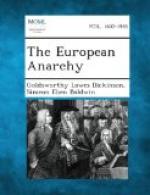There exists, it is true, a barbarous Germany, greedy of battles and conquest, the Germany of the country squires; there exists a Germany pharisaic and iniquitous, the Germany of all the unintelligible pedants whose empty lucubrations and microscopic researches have been so unduly vaunted. But these two Germanies are not the great Germany, that of the artists, the poets, the thinkers, that of Bach, Mozart, Beethoven, Goethe, Schiller, Heine, Leibnitz, Kant, Hegel, Liebig. This latter Germany is good, generous, humane, pacific; it finds expression in the touching phrase of Goethe, who when asked to write against us replied that he could not find it in his heart to hate the French. If we do not oppose the natural movement of German unity, if we allow it to complete itself quietly by successive stages, it will not give supremacy to the barbarous and sophistical Germany, it will assure it to the Germany of intellect and culture. War, on the other hand, would establish, during a time impossible to calculate, the domination of the Germany of the squires and the pedants.[1]
The generous dream was not to be realized. French chauvinism fell into the trap Bismarck had prepared for it. Yet even at the last moment his war would have escaped him had he not recaptured it by fraud. The publication of the Ems telegram made the conflict inevitable, and one of the most hideous and sinister scenes in all history is that in which the three conspirators, Bismarck, Moltke, and Roon, “suddenly recovered their pleasure in eating and drinking,” because, by publishing a lie, they had secured the certain death in battle of hundreds and thousands of young men. The spirit of Bismarck has infected the whole public life of Germany and of Europe. It has given a new lease to the political philosophy of Machiavelli; and made of every budding statesman and historian a solemn or a cynical defender of the gospel of force. But, though this be true, we have no right therefore to assume that there is some peculiar wickedness which marks off German policy from that of all other nations. Machiavellianism is the common heritage of Europe. It is the translation into idea of the fact of international anarchy. Germans have been more candid and brutal than others in their expression and application of it, but statesmen, politicians, publicists, and historians in every nation accept it, under a thicker or thinner veil of plausible sophisms. It is everywhere the iron hand within the silken glove. It is the great European tradition.
Although, moreover, it was by these methods that Bismarck accomplished the unification of Germany, his later policy was, by common consent, a policy of peace. War had done its part, and the new Germany required all its energies to build up its internal prosperity and strength. In 1875, it is true, Bismarck was credited with the intention to fall once more upon France. The fact does not seem to be clearly established. At any rate, if such was his intention, it was frustrated by the intervention of Russia and of Great Britain. During the thirty-nine years that followed Germany kept the peace.




